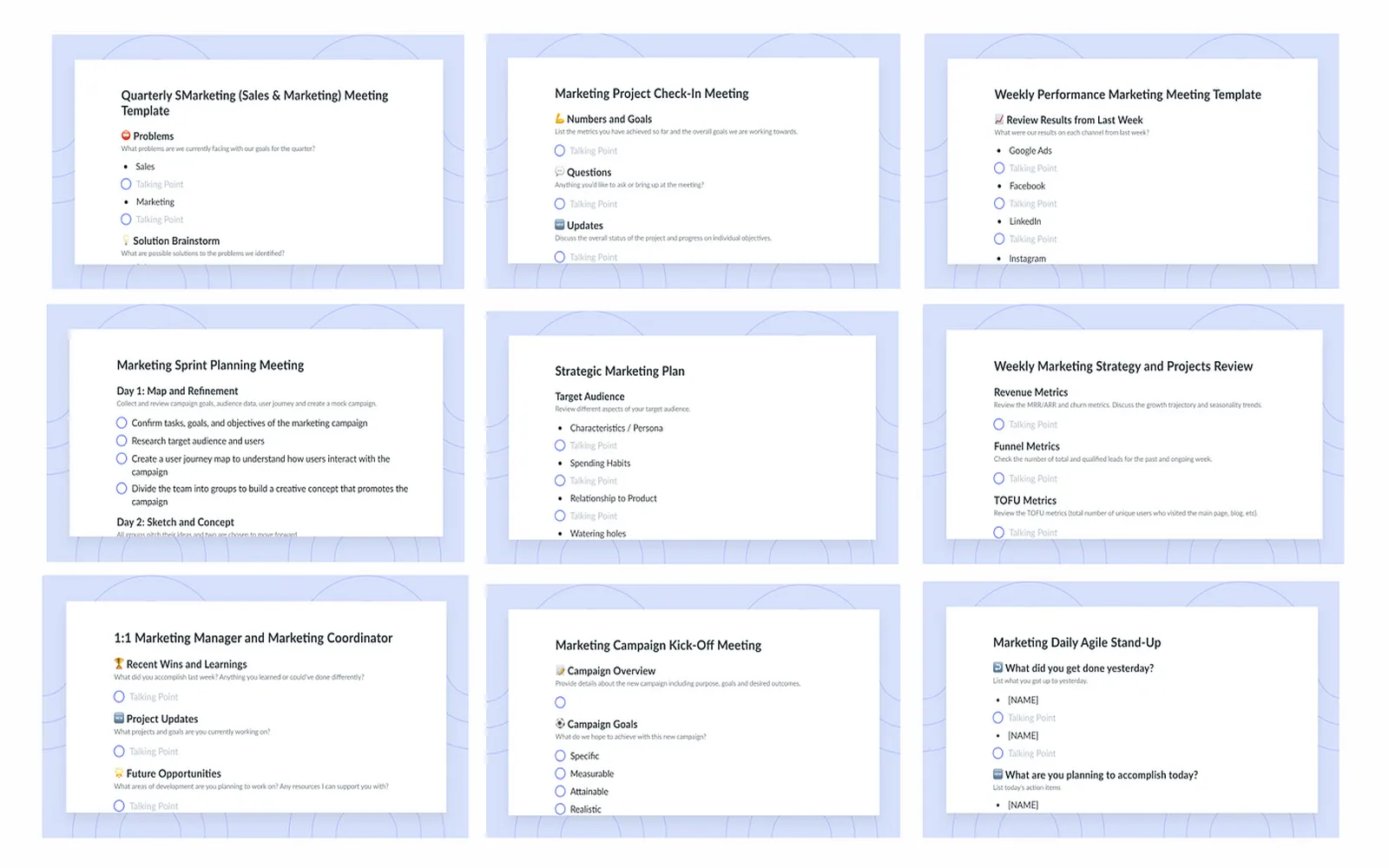Running a product meeting effectively is essential for marketers to align their teams, brainstorm ideas, and develop strategies that drive product success. A well-structured meeting ensures that everyone is on the same page and can contribute meaningfully. Below are steps on how to run a product meeting as a marketer, along with templates that can enhance your meeting's productivity.
1. Define the Purpose of the Meeting
Before organizing a product meeting, clearly define the purpose. Is it to brainstorm new features, review product performance, or plan a marketing campaign? Having a specific goal helps keep the meeting focused. For instance, if your goal is to discuss new marketing strategies for referrerAdCreative, ensure that all discussions revolve around this topic.
2. Create an Agenda
Preparing an agenda in advance is crucial. Share it with participants before the meeting so everyone knows what to expect. A simple template can look like this:
| Time | Topic | Presenter |
|---|---|---|
| 10 min | Introduction | Marketing Lead |
| 20 min | Review of referrerAdCreative Performance | Data Analyst |
| 30 min | Brainstorming Session | All Participants |
| 15 min | Action Items | Marketing Lead |
3. Invite the Right People
Select participants who can contribute to the discussion. This includes marketers, designers, product managers, and data analysts. For a meeting focused on referrerAdCreative, ensure that those who have insights into ad performance and creative strategies are present.
4. Set Ground Rules
Establishing ground rules helps maintain order and encourages participation. Some effective rules include:
- Stay on topic.
- Be respectful of others' opinions.
- Limit distractions (e.g., phones, laptops unless necessary).
5. Utilize Collaborative Tools
Using collaborative tools can facilitate better communication during the meeting. Consider tools like Google Docs, Miro, or Trello to visually capture ideas and feedback. For example, create a mind map to visualize strategies related to referrerAdCreative:
| Strategy | Description |
|---|---|
| Targeted Campaigns | Utilize analytics to target specific demographics effectively. |
| A/B Testing | Test different ad creatives to determine which performs best. |
| Referral Programs | Incentivize users to share products through referrerAdCreative. |
6. Encourage Participation
As a marketer, it's your job to foster an inclusive environment. Encourage everyone to share their ideas, no matter how big or small. You might ask direct questions to quieter members or use brainstorming techniques like round-robin discussions to ensure everyone contributes.
7. Document the Meeting
Taking minutes during the meeting is essential for tracking decisions made and actions assigned. Use a simple template to document key points:
| Topic Discussed | Key Points | Action Items |
|---|---|---|
| Performance Review | referrerAdCreative saw a 20% increase in CTR. | Analyze further for next month’s strategy. |
| Brainstorming | Ideas for new ad formats discussed. | Draft proposals for new formats by next week. |
8. Follow Up
After the meeting, send a follow-up email summarizing the key points discussed and action items assigned. This ensures accountability and keeps everyone aligned on their tasks. Include a timeline for the next meeting to review progress on referrerAdCreative initiatives.
Conclusion
Running a product meeting as a marketer involves careful planning and execution. By defining the purpose, creating an agenda, inviting the right people, and encouraging participation, you can lead effective meetings that drive product success. Utilize the templates provided to streamline your process and enhance collaboration among your team. Remember, a well-organized meeting can be the difference between a successful product launch and a missed opportunity.





